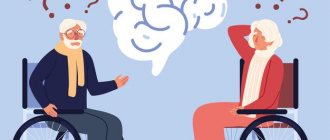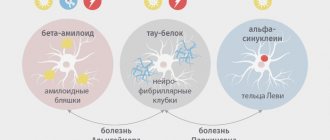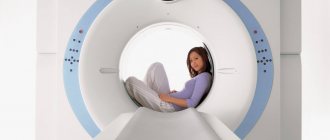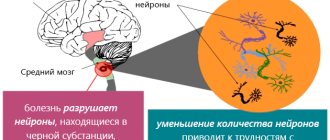Every 10 elderly people are diagnosed with dementia. Moreover, every 10 years this figure doubles as the number of elderly people grows. And in 50%-70% of cases it is associated with Alzheimer's disease1.
Alzheimer's disease is a chronic neurodegenerative disease characterized by the death of nerve cells in the brain. Since the neurons of the brain are destroyed, patients are characterized by disorders of memory and thinking, attention, speech, orientation in space, the ability to make decisions, and perform usual work duties. Mental disorders are expressed by anxiety and depression. In the later stages, intellect and mental activity disintegrate, and in general, motor disorders develop.
The disease is progressing all the time. On average, death occurs 8 years after diagnosis1. A medicine that can prevent the death of brain cells has not yet been invented, so the goal of treatment is to combat symptoms and increase life expectancy.
Kinds
The forms of the disease are divided according to age:
- with early (before 65 years) onset
- with late (after 65 years) onset
- atypical Alzheimer's disease (mixed type with vascular or other problems)
They differ not only in the age of onset of the disease. Often the timing of the onset of the first symptoms of Alzheimer's disease cannot be accurately determined, they are so invisible. It is important that the forms of Alzheimer's disease have significant differences in the clinical picture and features of the development of the disease, this allows for more accurate diagnosis.
Symptoms and signs
Symptoms and signs of Alzheimer's disease vary at different stages of the disease. First, short-term memory and the ability to remember new things are lost. The same questions are asked many times. Then abstract thinking is lost and long-term memory begins to suffer. Words, concepts, names of grandchildren, events of recent years are forgotten. Work tasks become impossible, writing and calculations are disrupted.
In older people, signs of Alzheimer's disease may include problems with mental calculations, forgetfulness, difficulty finding the right words, and handwriting becoming less legible.
In rare cases, the problem occurs before the age of 30, when there is a hereditary predisposition, as well as provoking factors such as diabetes mellitus and traumatic brain injuries. The difference is that the progression is much faster. First, short-term memory is impaired, then it becomes difficult to explain something. It is not always possible to start treatment on time, since Alzheimer's disease at a young age is easily confused with psychiatric diseases.
In women, the disease is more common and develops faster. Damage to nerve cells leads to changes in behavior: passivity, apathy, tearfulness, and frequent mood swings. Since the onset of the disease often coincides with menopause, it is not easy to determine that these are manifestations of Alzheimer's disease.
In men, the disease is diagnosed less frequently. Initial symptoms remain unnoticeable for a long time, and symptoms develop slowly.
First signs of Alzheimer's disease
Alzheimer's disease is the most common type of dementia and affects millions of people. Unfortunately, it is also the most difficult disease to treat. Symptoms usually appear after age sixty. Some of them may seem like normal age-related problems, but then it becomes clear that they are a sign of a more serious situation.
Here are some of the signals you should never ignore.
You forget important dates and events. It’s natural to forget some things—few people remember what they had for dinner last Tuesday. If a person begins to constantly forget about important dates and events, this may indicate the development of the disease.
You lose interest in certain things. One of the common personality changes in people with Alzheimer's is that they lose interest in things they previously enjoyed—or anything at all. According to research, loss of interest is one of the most commonly ignored symptoms.
You leave things in unusual places. Everyone forgets their keys sometimes, if you are very tired, you may accidentally put milk in the cupboard. For people with Alzheimer's, the problem takes on a different scale - the person begins to constantly leave things in strange places and his behavior is almost impossible to explain. What Highly Authentic People Don't Do
You feel confused. Everyone gets confused from time to time, but with Alzheimer's disease, the feeling of confusion is much more common. A person may not understand who he is, lose track of time, or confuse dates.
You have sudden mood swings. Everyone has their ups and downs, but there is one symptom of the disease that cannot be ignored - going from happiness to tears to aggression in record time.
You forget the names of everyday objects. Have you ever been confused about words and felt unable to find a name for a familiar, everyday object? Imagine what it’s like to experience this all the time! According to experts, people with Alzheimer's disease are often unable to remember the name of a simple object like a toaster or a comb.
You need constant reminders. If your memory works well, you can remember some things without writing them down. With the development of Alzheimer's disease, a problem arises - a person cannot remember anything and constantly uses reminders, and also needs the help of loved ones.
You get lost in familiar places. There is no worse feeling than not knowing exactly where you are. This is a fairly common sensation in people with Alzheimer's disease. The worst thing is that this happens even in very familiar places, for example, in the area near the house.
You are not able to cook according to the recipe. Even the cooking habits at home can tell a lot about a person with Alzheimer's. If you suddenly lose the ability to follow a familiar recipe, it may be that the disease has begun to change your condition.
You forget conversations. Sometimes a person is simply inattentive and cannot remember the conversation precisely because he did not listen. If you make an effort, but still have absolutely no idea what you were talking about with this or that person, this may indicate the development of Alzheimer's disease.
You can't keep track of the bills. There are a number of bills to pay every month. In the early stages of Alzheimer's, this can become a problem - it becomes difficult to work with numbers, you cannot control bills and pay them, although you previously understood everything easily.
Everything takes you longer. Over the years, all processes slow down, however, a person should not lose the ability to follow a plan and concentrate. If every little thing takes much longer than before, this may indicate Alzheimer's disease.
You lose motivation. If you've lost not only your zest for life but also your motivation, it's likely due to the behavioral changes associated with Alzheimer's disease.
You mix up words when you talk. If a person begins to confuse words in speech or writing, this may indicate the development of Alzheimer's disease. Such confusion in speech is typical for patients.
You have problems concentrating. When Alzheimer's disease begins to develop, a person may experience problems such as a shortened attention span. Someone who previously could easily carry on a conversation suddenly notices that he is unable to focus on something specific and finds it difficult to follow the flow of his interlocutor’s thoughts.
You forget the names of friends and family members. One of the most difficult problems with illness is that a person may forget the names of his close and long-time friends, and even family members. This may be difficult for others to bear, but this symptom is quite common.
You are suspicious of others. Instead of counting on the support of loved ones, patients become extremely distrustful. They may even accuse their loved ones of theft, infidelity and other unpleasant things. This behavior may be caused by memory loss and confusion.
You start dressing inappropriately. People with Alzheimer's disease often dress inappropriately - for example, they may wear very little clothing in the middle of winter or wear a lot of warm clothes in the heat of summer when the sun is very hot.
You can't play familiar games. If you used to often play card games, but suddenly forgot the rules, it could be Alzheimer's disease. In this case, any activity becomes more difficult and over time the person cannot even dress himself.
You have problems with critical thinking. People with Alzheimer's disease are especially likely to fall victim to scammers because they fail to properly assess the situation. As a result, a person may simply give away his money or make another bad decision.
You withdraw from society. Everyone needs time alone. You should worry when a person who was previously quite sociable and open suddenly completely loses interest in communication. This may be due to changes in brain health associated with Alzheimer's disease.
You forget what you said. If you constantly repeat phrases or questions as if it were the first time, this is a serious sign of illness.
You are too aggressive . If you suddenly begin to show aggression towards loved ones, the reason may be illness.
You cannot use the telephone. If you can't even handle phone calls, you should definitely be worried.
You are too passive. Everyone sometimes wants to just sit on the couch and watch TV. The problem is obvious when it becomes the norm - you just spend the whole day in front of a screen, without having the slightest interest in any other activities.
You get offended too easily. If you are offended and irritated for any reason, it may be worth thinking about the reasons for this condition. You have increased excitability If you just can’t cope with your nerves, the reason may be hidden in Alzheimer’s disease.
You can't do several things at the same time. These days, everyone is constantly doing a million things at once. For an Alzheimer's patient, this is an absolutely impossible task.
You are impulsive. As Alzheimer's disease progresses, a person begins to exhibit impulsive behavior.
Material from the Internet
Diagnostics
Tests
A neurologist or psychiatrist can make the correct diagnosis and identify the initial symptoms of Alzheimer's disease.
Diagnosis of Alzheimer's disease must be comprehensive.
In addition to the usual questioning and examination, psychological tests are used that identify problems with memory and cognitive functions at an early stage.
Examples of tasks:
- draw a clock face with a given time (for example 10.45);
- draw a clock face;
- reproduce a geometric figure from a picture;
- rewrite the sentence;
- read cards with words and then repeat;
- find the given symbol/number in the picture.
It is advisable for every elderly person to undergo testing in order to identify problems at an early stage.
Neuroimaging
Magnetic resonance imaging (MRI), computed tomography (CT), and positron emission tomography (PET) are used. These methods help to see changes in the structure of the brain. The doctor evaluates atrophic changes, the size of the grooves, gyri, and affected areas. Modern research helps to exclude other diseases, such as strokes, tumors, and prescribe the correct treatment.
Genetic testing
Helps to identify a disease with an early onset and aggressive course. Used in the diagnosis of familial forms of Alzheimer's disease.
Laboratory research
Allows you to exclude other diseases with similar symptoms of dementia. An analysis of liver enzymes, assessment of thyroid function, levels of B vitamins, folate, tests for syphilis, HIV, and urine testing are required. Examination of cerebrospinal fluid if a tumor or infection of the central nervous system is suspected.
A detailed analysis and history of the development of symptoms is important; this can increase the accuracy of diagnosing asthma to 90–95%2. It is important to note any new signs in the patient’s behavior. Sometimes this information plays a more important role compared to even CT/MRI studies.
Stages of the disease
Alzheimer's disease develops gradually, not all at once.
"Doubtful" dementia
The early stage may not be noticeable to others and can only be revealed through detailed neurocognitive tests. This stage is characterized by mild forgetfulness and inaccurate memories. You can also notice difficulties in determining the similarities and differences between objects and events. Abstract thinking and planning are difficult. In ordinary life, we won’t even notice this, so a person manages to hide or compensate for small problems in communication and work.
Mild dementia
Memory impairments become more obvious, especially for recent events. A person can get lost and forget his usual route. Confuse the order of events. Cannot find commonality or compare two objects or events. The ability to do calculations and write letters is lost. Such a person will speak slowly, use simple words, sometimes they may not be enough for reasoning. At the same time, the usual self-care activities are preserved.
Changes in behavior are already possible in the form of petty nonsense that someone is stealing from him, oppressing him, or causing harm. The state may be depressed due to the understanding that “something is wrong” with the head.
Moderate dementia
At this stage, learning new information becomes impossible. A person gets confused in the order of important events in his own life. He ceases to understand where he is and what time it is. The stock of memory and knowledge is constantly decreasing, they are becoming more and more inaccurate and blurred. Speech is impaired, first the ability to write is lost, then to read.
A “time shift” into the past may occur in consciousness. A person thinks and perceives everything as if he were not living today, but in a time that he still remembers. This may be accompanied by energy and a persistent desire for pseudo-activity.
Severe dementia
A person completely loses touch with reality, he not only does not orient himself in time and space, but also loses the idea of himself, his personality. Such a person cannot live independently. Attention is very weak. Reactions are more template, “automatic”. At the same time, emotional contact is preserved; an example would be “imaginary” conversations, when the patient tries to maintain a conversation, but its content is completely meaningless. The mood can change from aggression to apathy.
The patient is weakened psychologically and physically. Activity decreases sharply, complications develop in the form of bedsores, pneumonia, which leads to death.
Causes
There are many theories about the occurrence of Alzheimer's disease, but the exact cause has not been established.
The exact cause is still not determined.
Lack of acetylcholine. It was thought that the disease might be related to a deficiency of this neurotransmitter. But it turned out that the administration of this substance does not improve the condition of patients.
Amyloid theory. Amyloid protein is deposited in brain tissue and is detected on CT/MRI in the form of plaques. First, the transmission of nerve impulses is disrupted, then the brain cells die. It can take 10-15 years from the appearance of the first plaques to mild forgetfulness3.
Tau theory. Structural abnormalities occur in the structure of tau protein, which is contained in nerve cells. This disrupts the transmission of nerve impulses, and ultimately leads to the death of the neuron. These disorders are usually detected after the onset of amyloid plaques.
Genetic predisposition becomes the cause in only 10% of cases1.
Reasons for development
The causes of cognitive impairment are associated with somatic, neurological, psychiatric diseases and conditions, which include:
- Neurodegenerative, including Alzheimer's and Parkinson's diseases.
- Vascular pathologies, including ischemic and hemorrhagic strokes, chronic ischemic processes occurring in brain tissue.
- Encephalopathies of dysmetabolic origin.
- Neuroinfections.
- Intoxication.
- Demyelinating diseases.
- Injuries in the head area.
- Tumor processes.
- Disturbance of cerebrospinal fluid dynamics.
- Pregnancy.
- Depressive state, neuroses.
Most of the listed diseases are accompanied by the appearance in the medulla of numerous foci with an altered morphological structure, which leads to functional disorders in the functioning of the brain. Risk factors: old age, atherosclerotic lesions of cerebral vessels, history of arterial hypertension.
The reasons for the condition when you quickly forget everything can be associated with endocrine diseases, which are called dysmetabolic disorders and are associated with disorders such as hypothyroidism (deficiency of thyroid hormones), liver and kidney failure, and lack of B vitamins.
Memory deterioration occurs with long-term use of certain drugs. These include tricyclic antidepressants, antipsychotics (suppress mental activity, eliminate hallucinations, delusions and other symptoms of psychosis), anticholinergic drugs (used to treat parkinsonism and extrapyramidal disorders), benzodiazepines (have anticonvulsant, sedative, hypnotic, muscle relaxant effects).
Alzheimer's disease
The condition when you forget words and recently occurring events is called Alzheimer's disease, which in clinical practice is considered as the main cause of dementia in old age. The disease is characterized by progressive damage and death of neurons. In the later stages of the course, the patient loses the ability to self-care, and irreversible gross impairments of cognitive functions and behavior are observed.
Cerebrovascular pathologies
Pathologies of the circulatory system that feeds the brain occupy second place after neurodegenerative diseases among the causes of memory impairment and the development of dementia. A disease when a person forgets everything is called a disorder of cerebral blood flow, which can occur in both chronic and acute forms. The main reasons: atherosclerotic vascular damage, arterial hypertension, impaired neurohumoral regulation of vascular wall tone. Provoking factors: diabetes mellitus, history of lipid metabolism disorders.
Multiple sclerosis
One of the diseases where you don’t remember anything is called multiple sclerosis, in clinical practice it is considered as a demyelinating disease. This is an autoimmune pathological process of a chronic, progressive course, which is characterized by damage to the myelin sheath covering the nerve fibers.
Due to the destruction of the myelin sheath, which protects nerve fibers from damage and improves the transmission of nerve impulses, multifocal damage to the nervous system occurs. The disease is accompanied by neurological symptoms, including deterioration of memory and other cortical functions.
Injuries in the cranium area
Traumatic injuries to the skull and brain matter lead to disruption of brain function, which provokes memory impairment when you forget everything. In mild to moderate TBI, impairment of memory and other cortical functions predominates over other neurological symptoms.
TBIs occupy third place after vascular and neurodegenerative diseases in the total mass of pathologies that most often provoke memory impairment. Cognitive disorders develop as a result of mechanical damage to brain structures (compression, crushing) and other damaging factors - hemorrhage, edema, brain dislocation, disruption of liquor dynamics and cerebral blood flow.
Treatment
Today, treatment for Alzheimer's disease is aimed at combating symptoms and improving the quality of life of patients.
It is important to start treatment in a timely manner!
Cholinesterase inhibitors. The following drugs are used to combat acetylcholine deficiency:
- acetylcholine precursors (citicoline, choline alfoscerate);
- promoting the release of acetylcholine in the synapse (ipidacrine);
- capable of enhancing the effect of acetylcholine (galantamine);
- blocking the breakdown of acetylcholine (rivastigmine, donepezil, galantamine, ipidacrine);
Memantine is the only drug recommended worldwide for the treatment of dementia due to Alzheimer's disease. Can be used for moderate to severe cases.
Cerebrolysin – believed to increase brain cell viability.
All drugs can have significant side effects and have strict contraindications, so the dosage regimen is selected individually by the doctor. It is also impossible to supplement the treatment regimen with nootropics in order to support the brain on your own.
Treatment methods
The first signs of impulsive compulsive disorder should lead the patient to see a doctor. This will be followed by a diagnosis by a psychiatrist, who will determine the severity of the disease, after which the necessary treatment will be prescribed.
Therapy for OCD involves taking the following medications:
- Sedatives. Nootropics are prescribed that increase concentration and improve the activity of the mental parts of the brain.
- Herbal preparations. They are characterized by effective safety and are developed using plants that also calm the nervous system.
- Prescribing vitamin-mineral complexes that compensate for the lack of those components that provoke increased anxiety and stress. The vitamin complex should be aimed at an anti-stress effect, which will significantly improve the patient’s condition.
- Homeopathy. These drugs are also selected to achieve a sedative effect and restore the nervous system.
- A group of antidepressants. Prescribed exclusively by doctors after carrying out the necessary diagnostics. Recommended for severe disease.
When OCD occurs with complications, treatment with the introduction of psychotherapeutic techniques is required. They are aimed at improving the patient’s condition and finding the reasons that provoke obsessive fears. Therapeutic regimens in this case are selected individually.










